All natural cleaning products for a green clean
All natural cleaning products for a green clean
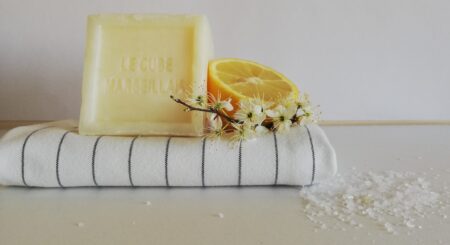
Spring is teasing us. Days are slowly stretching out before us like tightly coiled fern heads unfurling. Soon wildflowers will vie for our attention along the footpaths and lanes. For many of us, spring is the time when we treat our homes to a deep clean. A ritual that sees us shrugging off the curtain of dust that has settled in our homes over the preceding months and casting it out of the window.
Spring cleaning is a wholesome activity but increasingly the products we use to help ease the task are anything but. Ever ‘new and improved’ formulas cry out their promises from the supermarket shelves: ‘effortless cleaning’ and ‘odour eliminating technology’ that will leave your homes ‘fresh and sparkling’.
Cleaning Products and Chemicals
If you’ve ever had a moment to inspect the labels on some of the most popular household cleaning products you may have noticed the long list of chemical ingredients, many with names we don’t even know how to pronounce. There are infographics warning us that these products are dangerous to aquatic life or should only be used in well ventilated areas. From phthalates in synthetic fragrances to toxic fumes in oven cleaners, manufacturers have historically prioritised product performance in their efforts to drive sales. The UK CPI (UK Cleaning Products Industry Association) says:
‘Though soap is age-old, modern cleaning products let you clean clothes, dishes and the whole house in a fraction of the time it used to take, and in a safer and more sustainable way.’
We are all time poor and easily seduced by the notion that cleaning products will save us precious time, but seriously, can it really be proven that cleaning a kitchen countertop with a leading kitchen brand is substantially faster than carrying out the same action with a homemade natural alternative?
What does the CPI Mean?
The CPI’s statement begs the question ‘safer for what or whom?’. Yes, there is a level of cleanliness and personal hygiene that helps reduce the risk of germ spreading, but there is also an argument that chemicals within many household cleaners may be perpetuating other health issues.
I’m really not clear on the basis of their claim ‘modern cleaning products let you clean in a more sustainable way’. More sustainable how and compared to when? Maybe compared to 20 years ago when our mothers were throwing concentrated disinfectants down the sink in a bid to keep our homes smelling as they did when arriving home from hospital to a houseful of flowers.
Avoiding Irritants
If you look carefully at the list of bespoke fragrances used to conjure up that happy memory of returning home with a newborn, you will see that it is a list of irritants, all of which may cause allergic reactions, whose germ cell mutagenicity, carcinogenicity and reproductive toxicity data are mysteriously unavailable. Added to that, the packaging and its contents are to be disposed of as hazardous waste. Hmmmm.
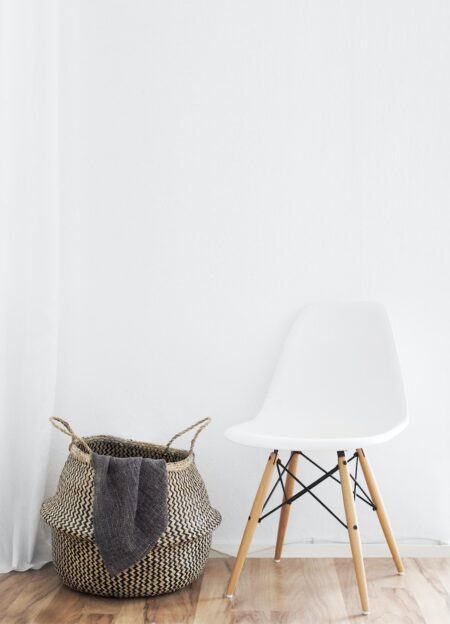
Cleaning Products and Health
Some of the ingredients found in cleaning products are toxic and several have been linked to health concerns such as asthma, lung damage, reproductive disorders and worse. While no health expert, this post, written off the back of a few days of online research, has me questioning the need for harsh cleaning chemicals in our daily lives when there are plenty of natural ingredients that can do an equally good job of helping us keep our homes clean.
The sustainable benefits of all natural cleaning products
The packaging of chemical cleaning products and its contents are to be disposed of as hazardous waste. That in itself is a telltale sign that the products may not be necessarily ‘good’. Furthermore, with each bottle of beach or spray cleaner we purchase, we are also buying the plastic container that contains it. Scientists estimate that “ 275 million metric tons (MT) of plastic waste was generated in 192 coastal countries in 2010, with 4.8 to 12.7 million MT entering the ocean.” By using products from our list of green products for cleaning, we can help to purge plastic from our spring cleaning routine.
Reducing Toxins in our Homes
Reducing the toxins we allow into our world is surely better for our bodies, better for the environment and certainly better for our pockets. So a few natural household cleaning tips gathered from writers, bloggers, family and friends to help make the switch to a less chemical crammed home. To start, you will need a few essentials:
Natural Cleaning Cupboard Essentials
- Beeswax Polish
- Bicarbonate of Soda (buy baking soda in bulk online)
- Table Salt/coarse ground salt
- White distilled vinegar
- Lemon/limes
- essential oil – tea tree, lavender, lemon,
- Olive oil/grape seed oil
- Refillable glass jars
- Cotton cloths
- Bristle Brushes
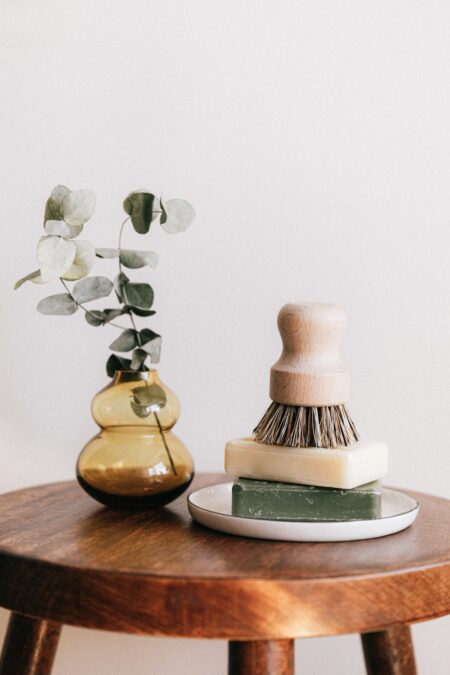
All Natural Cleaning Tips & Tricks for the Kitchen
Natural Sink Cleaner
Take ½ cup of baking soda and add 6 drops of essential oil or lemon juice. Rub around a rinsed sink and spray half a cup of distilled white vinegar over the mixture. Once the fizzing has stopped, rub with a damp cloth and rinse with hot water
Natural Oven Cleaning
Fill a heatproof dish with water and put it on a hot oven allowing the steam to soften any baked on grease. Switch of the oven, remove the dish and when cooled, apply a paste of equal parts salt, baking soda and vinegar. Scrub.
Natural Kitchen Cleaner
Lemons are useful, not only for cooking, but are also one of the best natural cleaners for keeping your home fresh. Lemon juice and vinegar make wonderful degreasers to clean any part of the home. To make a lemon and vinegar mixture, soak the rind from five lemons in a litre of white vinegar for up to 2 weeks. Use to wipe over work surfaces, stainless steel or microwaves.
Disinfecting Countertops
Mix a few drops of tea-tree oil and a tablespoon of vinegar with water in a spray bottle and you have an all-purpose cleaner that will cut through grime and disinfect kitchen surfaces.
Dishwasher Refresh
Place 2 cups of undiluted vinegar in a dishwasher safe bowl on the top shelf of the empty dishwasher, and run it on a hot cycle. It will help clear pipes and tackle musty odours. You can replace the vinegar with two halved lemons.
Cleaning Wooden Chopping Boards
Wood has natural antibacterial properties however you can effectively deep clean your chopping board and wooden utensils by rubbing them with coarse salt and half a lemon to get rid of odours. Once rinsed and dried, wipe over with oil (olive oil or grapeseed oil) to protect and enhance the wood grain.
Natural Cleaning Tips & Tricks throughout the Home
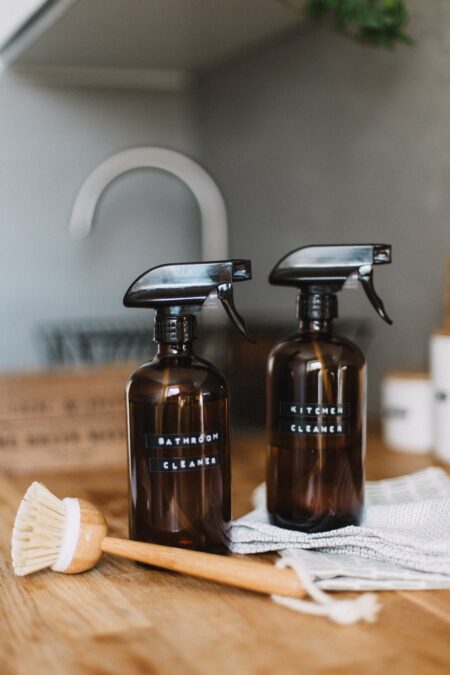
Lemon Dusters
Make homemade lemon dusters with 2 parts water, two parts vinegar and 2 drops of lemon or olive oil. Soak clean rags or cotton dusters in this solution overnight and squeeze out excess moisture leaving them just damp. Store the dusters in airtight glass jam or kilner jars with lemon rinds until ready to use.
Natural Furniture Polish
The main purpose behind furniture polish is to give wood protection against everyday damage and abrasions that can occur in a working household. However, store-bought furniture polish isn’t the only way to protect your wood. Many people are now using olive oil or natural beeswax as furniture polish. Not only are they a much milder solution compared to regular wood polishes, but olive oil is a cheaper, eco-friendly alternative.
Cleaning Glass
Vinegars acidic composition works efficiently to break down streaks and oily fingerprints that can accumulate on windows and mirrors. Simply mix ½ cup of vinegar to a litre of water. Decant into a spray bottle, spray onto glass and mirrors and rub off using a lint free cloth, or old newspaper.
Natural Laundry Detergent
Soap nuts are readily available online. Made from the dried fruit of the Chinese soapberry tree they can be popped into the washing machine in a little cotton sack in place of laundry detergent. They contain plant saponin, a natural soap that breaks down the surface tension of water creating a mild lather that penetrates fibres to lift away dirt.
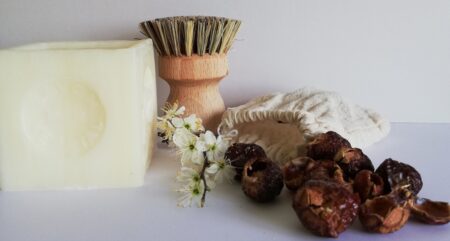
Natural Cleaning Tips & Tricks for the Bathroom
Removing Mildew
First and foremost, good ventilation is key to preventing mildew. However, to help remove what is already there, try a spray of 2 cups of water with ¼ teaspoon each of tea-tree and lavender oil. Shake before spraying onto the trouble spots and leave to dry for one hour to allow the oil to break down the mildew. After an hour, wipe away with a dry towel or cloth. Teatree is a natural fungicide that works as an effective cleaning product, and it even has the strength to prevent mold and mildew from returning.
Deodorising Drains
Adding vinegar and baking soda together creates a chemical reaction that fizzes and helps to dissolve stains and loosen grease, making them a useful natural cleaning combination.
Method:
1. Pour 2 tablespoons of bicarbonate of soda down the plug hole followed by half a cup of distilled white vinegar.
2. Leave it to bubble and fizz for half an hour before flushing through with cold water.
These two ingredients cannot be made ahead of time and kept in a spray bottle since the initial reaction is what helps with the cleaning process. Once the reaction is over, the liquid left behind is essentially just salt water which makes this mixture an effective natural cleaning product.
Whitening Toilets
For an effective toilet bowl cleaner, sprinkle one cup of bicarbonate soda in the toilet bowl and allow it to soak for an hour. Follow by spraying with approximately 1 cup of vinegar. Allow this to fizz and bubble for 5 minutes then flush.
Removing Limescale
Soak a towelling rag in distilled white vinegar and wrap it around taps and areas of limescale build up. Leave for half an hour then rinse clean. More stubborn areas of limescale may need a scrub with a hard-bristled brush prior to rinsing.
Shining Tiles
To bring life back to your tiles, spray a mixture of one part water to one part vinegar and leave for 5 minutes before wiping over with a damp cloth and rinsing with warm water. For a more thorough clean whilst still using all natural products, reuse old toothbrushes to scrub grout using a paste of baking soda and water before using cleaning the tiles with the 1:1 vinegar and water solution.
If you enjoyed this post on all natural cleaning products and green cleaners, then feel free to check out our other journal posts where we share more tips and advice on sustainability and health
Resources used in researching this post and places where you can find out more:
Books
- The Naturally Clean Home, Karyn Siegel-Maier
- Cabbages & Roses Guide to Natural Housekeeping, Christina Strutt
- Super Natural Home, Beth Greer
- Fresh Clean Home, Wendy Graham
- Green Interior Design, Lori Dennis
Blogs
Healthista, Wellness Mama, Apartment Therapy, Don’t Cramp My Style, Upworthy, Mentalfloss,
Other Sources
Greenpeace, UKCPI Association, Asthma UK, NHS, BBC online, British Medical Journal, Organic Consumers Organisation, The Independent, American Journal of Respiratory & Critical Care Medicine, Science Daily, UK Health & Safety Executive.